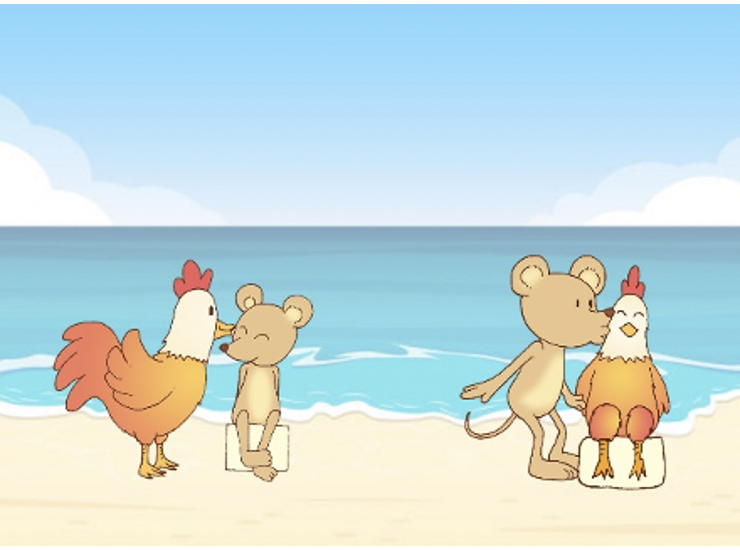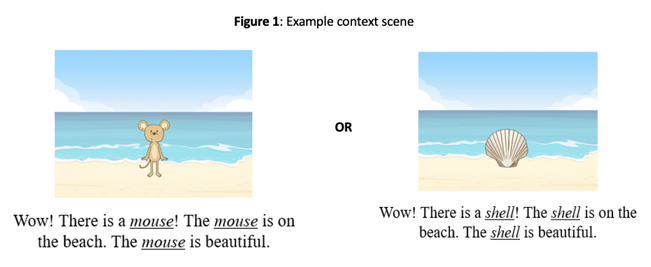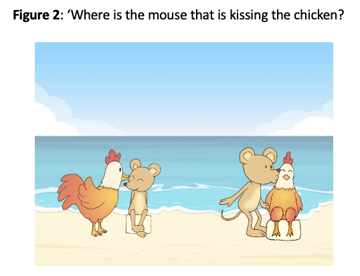
Have you ever been curious about the inner workings of child language development research? Allow me to share my developmental research experience during a six-week internship with LuCiD, where I had the opportunity to work at both the Babylab at Lancaster University and the Child Study Centre at the University of Manchester. Throughout this experience, I was fortunate enough to participate in not one, but two ongoing research projects, all under the mentorship of two LuCiD researchers: Dr. Jacky Chan from Durham University and Dr. Shijie Zhang from Manchester University.
Understanding Sentences with Jacky Chan
This project looked at how young children understand relative clauses. A relative clause adds further information about an object or a person within a sentence, and it usually starts with words such as "who", "where", and "that". For instance, in the sentence "Where is the mouse that is kissing the chicken?" the phrase "that is kissing the chicken" acts as the relative clause and gives more information about the object "mouse". In this study, we introduced young children to sentences containing objects referred to either by their names (e.g., "the mouse") or pronouns (e.g., "it" or "he"), with these objects appearing either in prior sentences or as entirely new references. Our curiosity lay in observing how young children process relative clauses across these distinct scenarios.
Young children were given a button-pressing task and their looking patterns were recorded by an eye-tracker. Initially, children were presented with a context scene in which either the object of the sentence (the mouse) or a completely irrelevant object was described.

Then, they were shown two images and instructed to push a button to select the image that matched the description in a question containing a relative clause (e.g., “Where is the mouse that is kissing the chicken?”).

My role in this project involved preparing the data from the eye-tracker for analysis. I coded some young children’s looks towards the left or right image to establish reliability of some computer codes that would automatically code the data. As part of this role, I received training on manually coding looking data in Excel and processing data.
Producing sentences with Shijie Zhang
This project looked at how children produce complex sentences, specifically sentences with an adverbial clause. An adverbial clause gives information about the main clause and always starts with a conjunction such as 'after,' ‘because’, 'before,' and 'if’. For example: ‘he brushes his teeth after he reads a book’. In this sentence, ‘after he reads a book’ is an adverbial clause providing information about the main clause ‘he brushes his teeth’. we gave participants a sentence completion task in which they had to produce a sentence using photos of everyday events that we provided and assessed their ability to use adverbial clauses in a sentence.

In addition to this main task, we gave the participants a number of other tasks to assess individual differences in general language skills, memory, and inhibitory control to determine how they contribute to children's performance. One of my roles in this research meant I received training to supervise psychological tests. For instance, one task I oversaw was the vocabulary test called The British Picture Vocabulary Scale III, which asks participants to choose one of four pictures that best shows a word's meaning.
Additionally, as this project was the first of multiple studies investigating this phenomenon, I got the chance to participate in the design and piloting of a second study for this research. One of the challenges we encountered when piloting the study was how children understood the task. For instance, the study required them to complete a sentence after a cough sound, but they struggled to grasp the concept of coughing which meant we had to rethink our design. The changing of the study design meant I was also able to help with recording the audio used for piloting sessions. This task proved to be more demanding than I initially thought, requiring additional steps to ensure it was suitable for children. For instance, I had to slow down my speech and use a higher pitch while recording.
In addition to assisting with research I had the privilege of contributing to the organisation of the 8th Lancaster International Conference on Infant and Early Child Development (LCICD 2023) conference, a conference that showcases research on early development from researchers worldwide. This opportunity allowed me to discuss and gain a greater awareness of other researchers’ work in different fields than I had previously been exposed to, which proved hugely valuable.
In summary, my six-week internship at LuCiD has been an extraordinary insight into the field of child development research. I have looked at how young children understand and produce language, contributed to the planning of a future study, and played a role in organising an international conference. From this internship, I have gained a wealth of knowledge and invaluable hands-on experience that will undoubtedly shape my academic and professional pursuits.
As I bring this chapter of my internship to a close, I want to express my gratitude for the opportunities, guidance, and mentorship I've received from Shijie Zhang, Jacky Chan, and the entire Babylab Team. This has truly been a memorable and invaluable experience that I would recommend to anyone who has an interest in developmental research!

